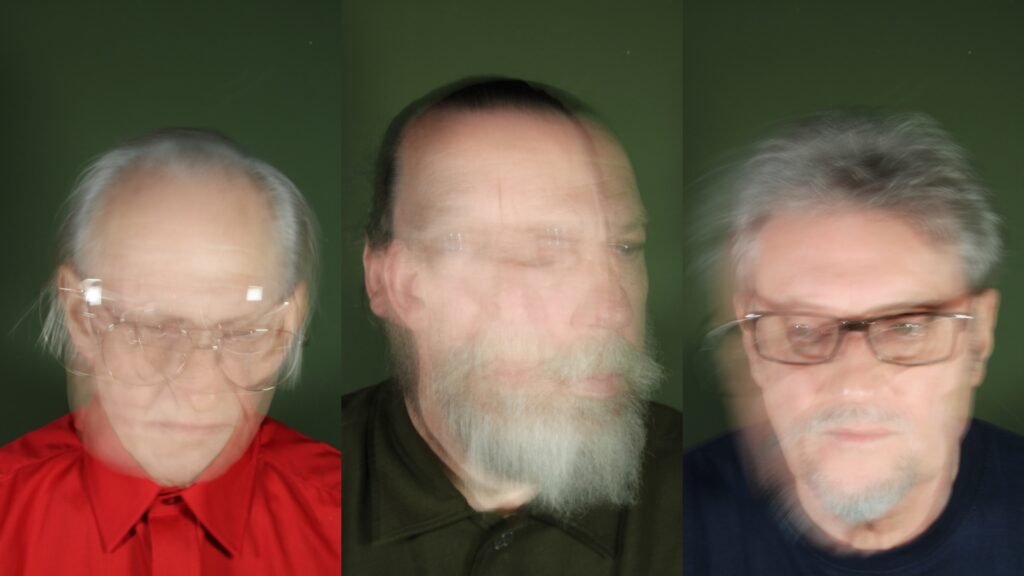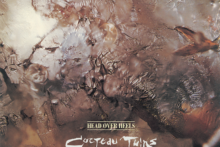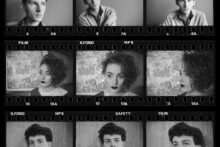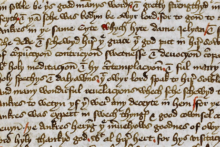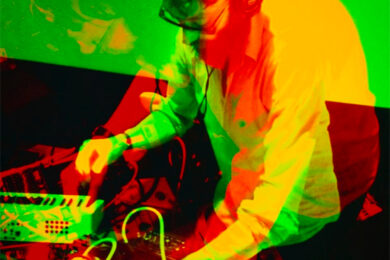When it comes to writing about music, the word eclectic does a lot of heavy lifting. Whether by bands wanting to impress upon listeners their broad and comprehensive tastes, or writers struggling to find a suitable pigeonhole to stick said band into, overuse can rob the word of any real meaning.
But for The Wolfgang Press [TWP], it’s the only way to describe them. Throughout the band’s initial incarnation in the late 80s and 90s – a run that saw them go from bleak post punk to proto-industrial funk to hip hop inspired avant pop – their eclecticism came not only from a place of curiosity and a desire to experiment, but also an almost pathological adversity to repeating themselves. To such a degree that when they finally did start treading water, they split up.
But that was nearly three decades ago, and in a year that’s becoming known for its reunions, the TWP are back, slightly reconfigured, with their first new album since 1995’s Funky Little Demons. A 2nd Shape finds the trio doing what they do best, which is basically whatever the hell they want. Since they emerged on 4AD, the independent label founded in 1980 by Ivo Watts-Russell and Peter Kent and known for its dark, ethereal, and mysterious aesthetic, TWP have trod a very singular path. But prior to the label making its name with Cocteau Twins, Dead Can Dance, and This Mortal Coil, 4AD was home to a particularly bleak strain of post-punk – some might call it goth – with pivotal releases from Bauhaus, Modern English, and The Birthday Party.
“Ivo was very singular in making sure that people had the freedom to express themselves and do what they wanted,” says singer and bassist Michael Allen. “He just gave us the money to go and make a record and that’s what we did, without any thought for how it would be received.”
All three original members of TWP were previously in bands that had early releases on the label: Allen and keyboard player Mark Cox were in both Rema-Rema and Mass, while guitarist Andrew Gray was a member of In Camera. Rema-Rema are particularly notable for being the first band to release a record bearing the 4AD logo. Despite splitting before it was released, Rema-Rema’s Wheel In The Roses EP is a post punk Rosetta Stone, with members going on to join Adam And The Ants, Psychic TV and Renegade Soundwave.
“Mark and I continued writing after Rema-Rema,” says Allen, “And we had two tracks – ‘Prostitutes’ and ‘Complete And Utter’ – that we wrote in Mark’s bedroom. We took them to Ivo, and he suggested we put out an album. So we then needed other people to help us, and we knew Andrew from In Camera.”
Despite TWP’s lineage being none more post punk, the dolorous The Burden of Mules (1983) – described by John Peel as “the most consciously morose record I’ve ever heard” – is a bit of an anomaly, one that the now three piece quickly moved on from. With Gray fully onboard, the trio released three EPs produced by Cocteau Twins’ Robin Guthrie which hinted at potential futures – Weil-style cabaret, lo-fi balladeering, even comedic cover versions – yet underpinning everything was a mechanised funk, partly a result of the band’s preference for drum machines.
“The thing about us is that we never wanted to do the same thing twice,” says Gray, “That was an important part of what we did. Maybe we took the wrong turn sometimes, but that was OK.”
Their next long-player Standing Up Straight, in 1986, was probably their most ‘4AD sounding’ album, down in no small part to the production of John Fryer, who’d worked with Cocteau Twins and This Mortal Coil, sculpting the cavernous, opulent sound of those bands’ records.
“We were always conscious of the influence of the producer,” says Gray, “Which is why we would change them every album and work with someone different.”
Despite the austere melancholy of Standing Up Straight, just underneath the clang of industrial percussion and sheets of coruscating guitar, a pop heart was beating, something that producer Flood brought to the fore for Bird Wood Cage in 1988.
“I think we came of age with Bird Wood Cage,” says Allen. “We’d been working towards something with the EPs and Standing Up Straight and Flood helped us to be more coherent.”
Probably TWP’s most fully realised album, Bird Wood Cage is also their most quietly influential, with wah-wah guitar, gospel vocals and depth charge dub scattered liberally throughout. Despite containing the fantastic singles ‘King Of Soul’, ‘Kansas’, and ‘Raintime’, and touring as a three piece, mainly in support slots, Bird Wood Cage sold modestly, although other bands were taking notes (just play ‘Shut That Door’ back-to-back with U2’s ‘The Fly’).
As always, 4AD were unconcerned about the commercial aspects, and encourage by Ivo, the band were already looking to change things up again.
“We get bored very easily, and it’s exciting to find a different approach,” says Allen, “Sometimes it doesn’t work, but it’s like any art, you’re trying to move forward. We’d started sampling very crudely on Bird Wood Cage, and then it kind of blew up because the technology got a lot cheaper. I also really liked the idea of taking something, even just a sound, and using as the basis for something completely different.”
Alongside the sampling, the band expanded to include Dif Juz’s Richie Thomas on drums and Throwing Muses’ Leslie Langston on bass. This resulted in the more organic sounding Queer (1991), and found clubbier elements augmenting their ominous groove. Not that they went clubbing, of course.
“We were a little bit old for that,” says Allen, “But I have been quoted as saying that the main influence on Queer was De La Soul, which is true, but not in that we wanted to sound like 3 Feet High and Rising. Rather we wanted to have the same joy and looseness that they captured on that album.”
With a full band behind them, and Ivo having inked a deal with Warner Brothers in the US, TWP set their sights across the Atlantic and toured Queer comprehensively throughout 1992. Standalone single ‘A Girl Like You’ even crept up to No 2 on the US Billboard Modern Rock chart in August of that year, and piqued the interest of an unlikely musical institution.
“Our publisher had been approached by Tom Jones’ manager – who’s also his son – asking if he had any songs by independent artists that Tom could cover for his next album,” says Allen. “So he sent over a compilation album and pointed them towards a Love and Rockets track. The story we were told is that ‘A Girl Like You’ was the track after, and that’s when Tom heard it.”
Not only did Jones record the track for his 1994 album The Lead and How to Swing It, TWP were even asked to record the backing for it.
“He sang it while we were in the studio with him,” says Allen. “And after that we wrote a song for specifically for him [‘Show Me (Some Devotion)’], and when it came to him doing his vocal I was directing him! I’d say something like, Maybe tone it down on the verse a bit Tom, and he’d say, “Oh, OK then, right you are.” He was great, lovely fella.”
You don’t get that with His Name Is Alive.
Despite the patronage of an old school icon, a hit single, and Nine Inch Nails manager John Malm Jr. onboard, TWP struggled to convert that into further success.
“It was just so hard,” says Gray. “What Warner did with their so-called alternative bands back then was throw them out there see what sticks. And we were in the same batch as Green Day, and when they really took off, Warner’s sort of lost interest in us.”
The experience seemed to take the wind out of the band’s sails, and in an unusual move for them, they decided to stick with the same producer, John Madden, for their next album, perhaps to stabilise the internal issues going on within the band.
“There’re a couple of good tracks on Funky Little Demons [released in 1995] but it was bitty and lacked atmosphere,” says Gray. “ And I don’t know what was going on with Mark but he wasn’t really coming in, which made everything very hard.”
Sidelining the samples in favour of writing songs from scratch, and fleshing them out with the live band which now included Segs from The Ruts DC on bass, the resulting album was solid if somewhat pedestrian when compared to what had gone before.
“We were exhausted and I don’t think we were communicating very well,” says Allen, “We got the album finished but it was unfulfilling for me. We did tour it in the US, although Mark had left by that point, and at the end of it Warners dropped us. Ivo had left 4AD as well so we didn’t have anyone in our camp there anymore, so that was kind of it really.”
There was enough residual interest to release the 2001 compilation Everything Is Beautiful (A Retrospective 1983-1995), which leaned into the poppier side of the band and seemed to be a full stop. Over the years Allen and Gray have been involved in new music and even appeared on each other’s projects: Allen providing vocals and keyboards to Gray’s 2002 Limehouse Outlaw album Homegrown, and Gray adding production to the debut album from Allen’s Geniuser project, Mud Black (2005). “We were always in touch,” says Gray, “Supporting each other, helping each other out.”
TWP weren’t entirely forgotten though, with the likes of John Grant and Karl ‘Regis’ O’Connor namechecking the band, and in Grant’s case openly citing them as an influence. The TWP name was reactivated for Unremembered Remembered (2020), a Record Store Day release of the demos Allen and Gray recorded for a possible follow up to Funky Little Demons. Various other events such as the 2022 Rema-Rema documentary What You Could Not Visualise and an aborted project with that band’s former singer and Renegade Soundwave founder Gary Asquith, kickstarted Allen, Gray, and his brother Stephen working together, the results of which became A 2nd Shape.
“We always started with the noise,” says Allen, “And that’s what we did with A 2nd Shape.”
Going back to pre-Pro Tools methods of recording, Gray sourced an old ADAT eight track and VHS tapes from eBay.
“I’m analogue really and I was getting frustrated with recording on computers,” he says. “I can do it but it just doesn’t interest me. You can never really push things, there’s no headroom, and I find it hard to get a solidness out of a computer.”
As the tracks were finished, the trio recorded three versions of each, one after the other straight to tape, and then chose the best take. As the project progressed, talk inevitably turned to what to do with the material, and what name to put it out under.
“We weren’t consciously trying to make it sound like TWP, because I don’t know what that is,” says Allen. “And to be honest I was slightly uncomfortable using that name, but at the end of the day it is me and Andrew. No way am I denigrating Mark’s contribution, because the things he added were exceptional. But Andrew and I were the writers and Mark would brilliantly embellish what we were doing. Which is the role Stephen has now.”
Having watched his brother’s band from the sidelines, Stephen Gray has a unique take on TWP, and brings that to the creative process. “I’d have been a fan even if my brother wasn’t in the band,” he says, “But I have that fan’s knowledge which they don’t have, so subconsciously that informs how I contribute.”
Musically A 2nd Shape is obviously TWP, but only in as much as it’s as uncompromising as ever and doesn’t sound like anything they’ve done before. Allen’s aching baritone is unchanged, as is his rolling dubby bass, while Gray’s treatment of the guitar is as irreverent and inventive as before. But Stephen’s analogue synth and electronic textures are colder and more expressionistic, and the limitations of the records analogue production add urgency and drive to the album.
Opener ‘This Garden of Eden’ finds Gray wrenching howls of distortion from his guitar, while Allen intones “I could change, I can’t change” over dubby bass. The woozy ‘Sad Surfer’ – inspired by the tragic Victorian painter Richard Dadd – and the subterranean ‘Knock Knock’ search for some kind of meaning in modern life: “‘A Jackie Collins novel isn’t Shakespeare,” intones Allen. “But it’s still here.” All the album’s nine tracks are infused with a distinctly 21st century paranoia, something that suits TWP’s new fragmented funk.
“It’s more concise than any of the other albums because there’s only bass, singing and guitar, and a few little keyboards,” says Gray. “We’ve stripped down the instrumentation – there are no glockenspiels for a start!”
With one show lined up at SoundEdit ’24 in Poland at the end of next month, TWP are approaching live appearances tentatively, knowing that things are very different to when they last went out on the road.
“None of us want to play to three men and a dog,” says Allen. “We’d prefer to support someone, ideally. We’ll do it as a three piece like we did in the early days, using backing tapes and stripping it down.”
The reemergence of TWP may well turn out to be the 2024 reunion we didn’t know we wanted, but perhaps we all needed. And among all the bluster of bands getting back together for transparently financial reasons, the integrity of three man in their sixties wanting to do it for the right reasons is as refreshing as it is inspiring.
“It’s lovely to hear that people like John Grant and Karl are fans and cite us an influence, but we’re completely ignorant of that,” says Allen. “We always felt so far from what everyone else was doing, but we stuck to our principles for the main part. But it does give us a feeling that maybe we did have something to say, and knew the best way to say it.”
A 2nd Shape is released by Downwards Records on 27 September. TWP will play SoundEdit ’24 in Poland on 27 October

